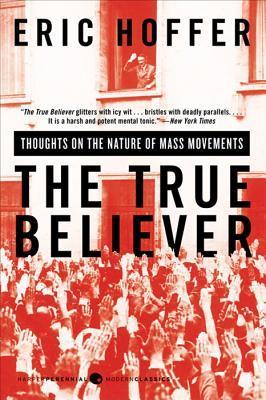More on this book
Community
Kindle Notes & Highlights
anything ail a man,” says Thoreau, “so that he does not perform his functions, if he have a pain in his bowels even … he forthwith sets about reforming—the world.”
Discontent by itself does not invariably create a desire for change. Other factors have to be present before discontent turns into disaffection. One of these is a sense of power.
If the Communists win Europe and a large part of the world, it will not be because they know how to stir up discontent or how to infect people with hatred, but because they know how to preach hope.
Fear of the future causes us to lean against and cling to the present, while faith in the future renders us receptive to change.
For men to plunge headlong into an undertaking of vast change, they must be intensely discontented yet not destitute, and they must have the feeling that by the possession of some potent doctrine, infallible leader or some new technique they have access to a source of irresistible power. They must also have an extravagant conception of the prospects and potentialities of the future. Finally, they must be wholly ignorant of the difficulties involved in their vast undertaking. Experience is a handicap.
When a mass movement begins to attract people who are interested in their individual careers, it is a sign that it has passed its vigorous stage;
According to Hitler, the more “posts and offices a movement has to hand out, the more inferior stuff it will attract, and in the end these political hangers-on overwhelm a successful party in such number that the honest fighter of former days no longer recognizes the old movement…. When this happens, the ‘mission’ of such a movement is done for.”
Faith in a holy cause is to a considerable extent a substitute for the lost faith in ourselves.
The less justified a man is in claiming excellence for his own self, the more ready is he to claim all excellence for his nation, his religion, his race or his holy cause.
In pre-Hitlerian Germany it was often a toss up whether a restless youth would join the Communists or the Nazis.
“Whatever happens, I shall be well off. If Shemuel [the revolutionary son] is right, we shall all be happy in Russia; and if Chaim [the Zionist] is right, then I shall go to live in Palestine.”1
Every mass movement is in a sense a migration—a movement toward a promised land; and, when feasible and expedient, an actual migration takes place.
Discontent is likely to be highest when misery is bearable;
It is not actual suffering but the taste of better things which excites people to revolt.
Fanatics, says Renan, fear liberty more than they fear persecution.
Where freedom is real, equality is the passion of the masses. Where equality is real, freedom is the passion of a small minority.
Equality without freedom creates a more stable social pattern than freedom without equality.
A rising mass movement attracts and holds a following not by its doctrine and promises but by the refuge it offers from the anxieties, barrenness and meaninglessness of an individual existence.
Where the corporate pattern is strong, it is difficult for a mass movement to find a footing.
when the Christian church had the power to segregate the Jews in ghettos, it gave their communal compactness an additional reinforcement, and thus, unintentionally, ensured the survival of Judaism intact through the ages.
Pascal was of the opinion that “one was well-minded to understand holy writ when one hated oneself.”
Renan, “The day after that on which the world should no longer believe in God, atheists would be the wretchedest of all men.”
Mass movements can rise and spread without belief in a God, but never without belief in a devil.
When Hitler was asked whether he thought the Jew must be destroyed, he answered: “No…. We should have then to invent him. It is essential to have a tangible enemy, not merely an abstract one.”
the ideal devil is a foreigner.
To wrong those we hate is to add fuel to our hatred.
It is easier to hate an enemy with much good in him than one who is all bad.
Passionate hatred can give meaning and purpose to an empty life.
Pascal says that “all men by nature hate each other,”
Renan says that we have never, since the world began, heard of a merciful nation.
Dr. Goebbels admits in an unguarded moment that “A sharp sword must always stand behind propaganda if it is to be really effective.”
“He who complies against his will is of his own opinion still.”
There is a period of waiting in the wings—often a very long period—for all the great leaders whose entrance on the scene seems to us a most crucial point in the course of a mass movement.
He must, as someone said, find out where the people are going so that he may lead them.
Men of thought seldom work well together, whereas between men of action there is usually an easy camaraderie.
“Marching diverts men’s thoughts. Marching kills thought. Marching makes an end of individuality.”
By elevating dogma above reason, the individual’s intelligence is prevented from becoming self-reliant.
movement is pioneered by men of words, materialized by fanatics and consolidated by men of action.
man of words might change into a genuine fanatic or into a practical man of action.
blindness of the fanatic is a source of strength
Oliver Cromwell: “A man never goes so far as when he does not know whither he is going.”
In the eyes of the true believer, people who have no holy cause are without backbone and character—a pushover for men of faith.


